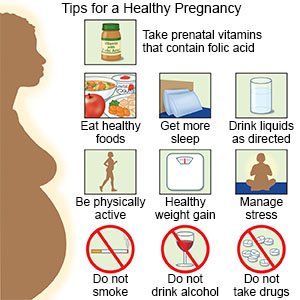Pregnancy at 19 to 22 Weeks
Medically reviewed by Drugs.com. Last updated on Aug 4, 2025.
What changes are happening with my body?
Now that you are in your second trimester, you have more energy. You may also be feeling hungrier than usual. You may be gaining about ½ to 1 pound a week, and your pregnancy is beginning to show. You may need to start wearing maternity clothes. As your baby gets larger, you may have other symptoms. These may include body aches or stretch marks on your abdomen, breasts, thighs, or buttocks.
How do I care for myself at this stage of my pregnancy?
 |
- Eat a variety of healthy foods. Healthy foods include fruits, vegetables, whole-grain breads, low-fat dairy foods, beans, lean meats, and fish. Drink liquids as directed. Ask how much liquid to drink each day and which liquids are best for you. Limit caffeine to less than 200 milligrams each day. Limit your intake of fish to 2 servings each week. Choose fish low in mercury such as canned light tuna, shrimp, salmon, cod, or tilapia. Do not eat fish high in mercury such as swordfish, tilefish, king mackerel, and shark.

- Take prenatal vitamins as directed. Your need for certain vitamins and minerals, such as folic acid, increases during pregnancy. Prenatal vitamins provide some of the extra vitamins and minerals you need. Prenatal vitamins may also help to decrease the risk of certain birth defects.

- Talk to your healthcare provider about exercise. Moderate exercise can help you stay fit. Your healthcare provider will help you plan an exercise program that is safe for you during pregnancy.

- Do not smoke. Smoking increases your risk of a miscarriage and other health problems during your pregnancy. Smoking can cause your baby to be born too early or weigh less at birth. Ask your healthcare provider for information if you need help quitting.
- Do not drink alcohol. Alcohol passes from your body to your baby through the placenta. It can affect your baby's brain development and cause fetal alcohol syndrome (FAS). FAS is a group of conditions that causes mental, behavior, and growth problems.
- Talk to your healthcare provider before you take any medicines. Many medicines may harm your baby if you take them when you are pregnant. Do not take any medicines, vitamins, herbs, or supplements without first talking to your healthcare provider. Never use illegal or street drugs (such as marijuana or cocaine) while you are pregnant.
What are some safety tips during pregnancy?
- Avoid hot tubs and saunas. Do not use a hot tub or sauna while you are pregnant, especially during your first trimester. Hot tubs and saunas may raise your baby's temperature and increase the risk of birth defects.
- Avoid toxoplasmosis. This is an infection caused by eating raw meat or being around infected cat feces. It can cause birth defects, miscarriages, and other problems. Wash your hands after you touch raw meat. Make sure any meat is well-cooked before you eat it. Avoid raw eggs and unpasteurized milk. Use gloves or ask someone else to clean your cat's litter box while you are pregnant.

Related medications
What changes are happening with my baby?
By 22 weeks, your baby is about 8 inches long from the top of the head to the rump (baby's bottom). Your baby also weighs about 1 pound. Your baby is becoming much more active. You may be able to feel the baby move inside you now. The first movements may not be that noticeable. They may feel like a fluttering sensation. As time goes on, your baby's movements will become stronger and more noticeable.
What do I need to know about prenatal care?
During the first 28 weeks of your pregnancy, you will see your healthcare provider once a month. Your healthcare provider will check your blood pressure and weight. You may also need the following:
- A urine test may also be done to check for sugar and protein. These can be signs of gestational diabetes or infection. Protein in your urine may also be a sign of preeclampsia. Preeclampsia is a condition that can develop during week 20 or later of your pregnancy. It causes high blood pressure, and it can cause problems with your kidneys and other organs.
- Fundal height is a measurement of your uterus to check your baby's growth. This number is usually the same as the number of weeks that you have been pregnant.
- A fetal ultrasound shows pictures of your baby inside your uterus. It shows your baby's development. The movement and position of your baby can also be seen. Your healthcare provider may be able to tell you what your baby's gender is during the ultrasound.

- Your baby's heart rate will be checked.
When should I seek immediate care?
- You develop a severe headache that does not go away.
- You have new or increased vision changes, such as blurred or spotted vision.
- You have new or increased swelling in your face or hands.
- You have vaginal spotting or bleeding.
- Your water broke or you feel warm water gushing or trickling from your vagina.
When should I call my doctor or obstetrician?
- You have abdominal cramps, pressure, or tightening.
- You have a change in vaginal discharge.
- You cannot keep food or drinks down, and you are losing weight.
- You have chills or a fever.
- You have vaginal itching, burning, or pain.
- You have yellow, green, white, or foul-smelling vaginal discharge.
- You have pain or burning when you urinate, less urine than usual, or pink or bloody urine.
- You have questions or concerns about your condition or care.
Care Agreement
You have the right to help plan your care. Learn about your health condition and how it may be treated. Discuss treatment options with your healthcare providers to decide what care you want to receive. You always have the right to refuse treatment. The above information is an educational aid only. It is not intended as medical advice for individual conditions or treatments. Talk to your doctor, nurse or pharmacist before following any medical regimen to see if it is safe and effective for you.© Copyright Merative 2025 Information is for End User's use only and may not be sold, redistributed or otherwise used for commercial purposes.
Learn more about Pregnancy at 19 to 22 Weeks
Care guides
Further information
Always consult your healthcare provider to ensure the information displayed on this page applies to your personal circumstances.
